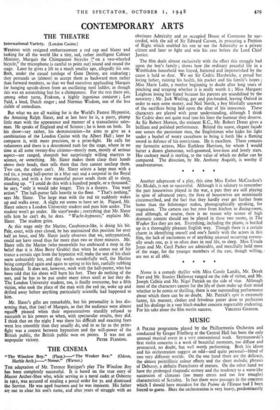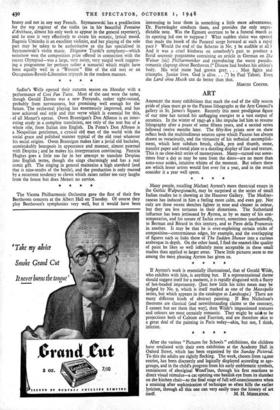MUSIC
A POLISH programme played by the Philharmonia Orchestra and conducted by Gregor Fitelberg at the Central Hall has been the only unusual musical event in a very conventional week. Szymanowski's first violin concerto is a work of beautiful moments, too diffuse and protracted, no doubt, but well worth performing. Both his idiom and his orchestration suggest an odd—and quite personal—blend of two very different worlds. On the one hand there are the delicacy, the almost pointillistic colour effects and the short melodic phrases of Debussy, a definite Frenchness of texture. On the other hand we have the prolonged rhapsodic ecstasy and the tendency to a wave-like succession of climaxes (too many crests and too few troughs) characteristic of Scriabin. In fact there were passages in the concerto which I should have mistaken for the Poime de l'Extase had I been forced to guess. Here the orchestration is very heavy, predominantly
brassy and not in any way French. Szymanowski has a predilection for the top register of the violin (as in his beautiful Fontaine d'Arithuse, almost his only work to appear in the general repertory), and he uses it very effectively to create his ecstatic, lyrical mood. Eugenia Uminska is an excellent violinist, and her playing of the solo part may be taken to be authoritative as she has specialised in Szymanowski's violin music. Zbigniew Turski's symphony—which somehow won the composition prize offered in connection with the recent Olympiad—was a large, very noisy, very turgid work:suggest- ing a programme (or perhaps rather a scenario) which might have been equally well in a "Western " film of the old sort or an Occupation-Revolt-Liberation triptych in the modern manner.
* * * * Sadler's Wells opened their autumn season on Monday with a performance of Cosi Fan Tutte. Most of the cast were the same, though Gerald Davies was a new Ferrando, rather tight-voiced, probably from nervousness, but promising well enough for the future. The orchestral playing has enormously improved, and has now achieved real style and that verve which is essential for this, - of all Mozart's operas. Owen Brannigan's Don Alfonso is an inter- esting study in a complete translation, not only of the text but of a whole role, from Italian into English. Da Ponte's Don Alfonso is a Neapolitan gentleman, a cynical old man of the world with the social grace and polished manner typical of the old roué whatever his social origins. Owen Brannigan makes him a jovial old bachelor, unmistakably bourgeois in appearance and manner, almost paternal with Despina ; and he makes his interpretation convincing. Patricia Hughes goes a little too far in her attempt to translate Despina into English terms, though she sings charmingly and has a real comic gift. The singing in general maintains a high standard (and that is nine-tenths of the battle), and the production is only marred by a recurrent tendency to clown which raises rather too easy laughs from the house but does Mozart no service.
The Vienna Philharmonic Orchestra gave the first of their five Beethoven concerts at the Albert Hall on Tuesday. Of course they play Beethoven's symphonies very well, but it would have been
interesting to hear them in something a little more adventurous. Dr. Furtwangler conducts them, and provides the only unpre- dictable note. Was the Egmont overture to be a funeral march as its opening led one to suppose ? What sudden sluice was opened that made the brook of the Pastoral surge forward at such a rapid pace ? Would the end of the Scherzo in No. 5 be audible at all ? And it was a cruel kindness on somebody's part to produce a florid souvenir programme containing an article in German on Die Weiner (sic) Philharmoniker and reproducing the worst pseudo- romantic claptrap about Beethoven (" Disease had broken his athlete's body. His wild mane had grown grey. . . . Man fights and triumphs. Justice lives. God is alive. . . .") by Paul Tabori. Even das Land ohne Musik can do better than that.
MARTIN COOPER.



































 Previous page
Previous page